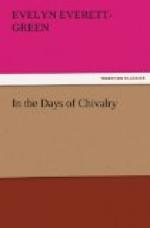“What posts?” asked the eager youths.
“The head of your branch of this noble house,” continued the priest, “is your uncle Sir John de Brocas, who is the King’s Master of the Horse, and the lord of many fair Manors and wide lands in England, and high in favour with his master. Second in the line is your uncle Master Bernard de Brocas, a clerk, and the Rector (as it is called in the realm of England) of St. Nicholas, in or near a town that is called Guildford — if I can frame my lips aright to the strange words. He too is high in favour with the Roy Outremer, and, as I have heard, is oft employed by him in these parts to quell strife or redress grievances; but I know not how that may be. It is of thy father that I would fain speak to thee, Gaston, for thou art heir to his name and estate if thou canst make good the claim, as in time thou mayest yet. Listen whilst I tell all that I know. Thy father — Arnald — was the youngest of the three sons of him who died on the field of Bannockburn, and to him was given the post of Master of the Horse to Prince John of Eltham. I misdoubt me if that Prince is living yet; but of that I cannot speak with certainty. He was also valettus or serviens to the King, and might have carved out for himself as great a career as they, had it not been that he estranged himself from his kindred, and even offended the King himself, by the marriage that he made with Mistress Alice Sanghurst of Basildene.”
The brothers exchanged quick glances as the name passed the priest’s lips. Their memory had not then played them false.
“But why were they thus offended? Was not our mother rightful owner of Basildene? and is it not a fair heritage?”
“The reason for the ill will, my sons, I know not. Your mother did not fully understand it, and from her lips it was I heard all this tale. Perchance some nobler alliance was wished by the family and by the King himself, perchance the young man acted something hastily, and gave umbrage that might have been spared. I know not how that may have been. All I for certainty know is that your father, Arnald, brought hither his wife, flying from some menaced peril, fearful of capture and discovery; and that here in this lonely mill, amongst those who had ever loved the name of De Brocas, the sweet lady was able to hide her head, and to find a place of safe refuge. Jean, then a youth, had been in the service of Arnald, having been seized with a love of wandering in his boyhood, which had led him to cross the sea to England, where he had fallen in with your father and attached himself to his person. The elder Jean, his father, was miller then and right glad was he to welcome back his son, and give a shelter to the lady in her hour of need. Good Margot, as you know, was your nurse when you were born; she had married Jean a short time back, and her own babe had died the very week before you came into the world. She has always loved you as her own, and though your mother was taken from you, you have never lost a mother’s love. Do not forget that, my children, in the years to come; and if the time should ever be when you can requite the faithful attachment of these two honest hearts, be sure that you let not the chance slip.”




